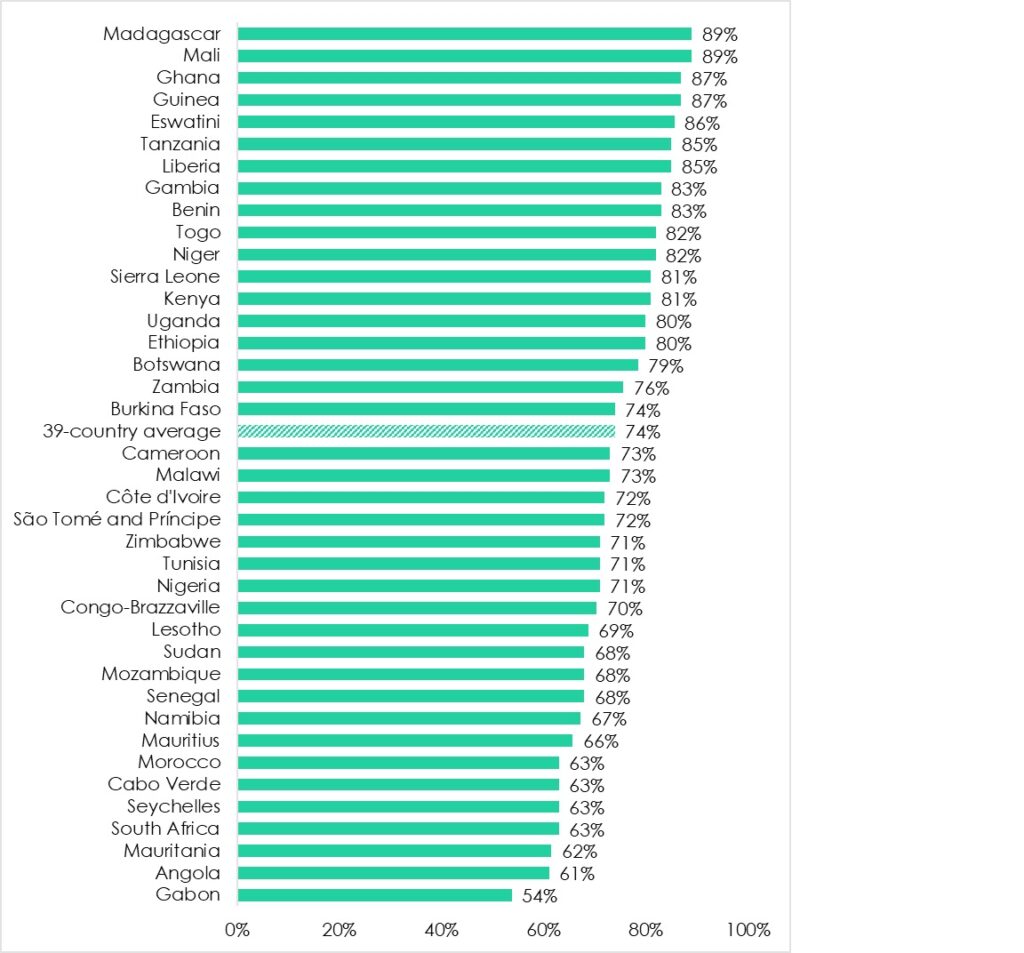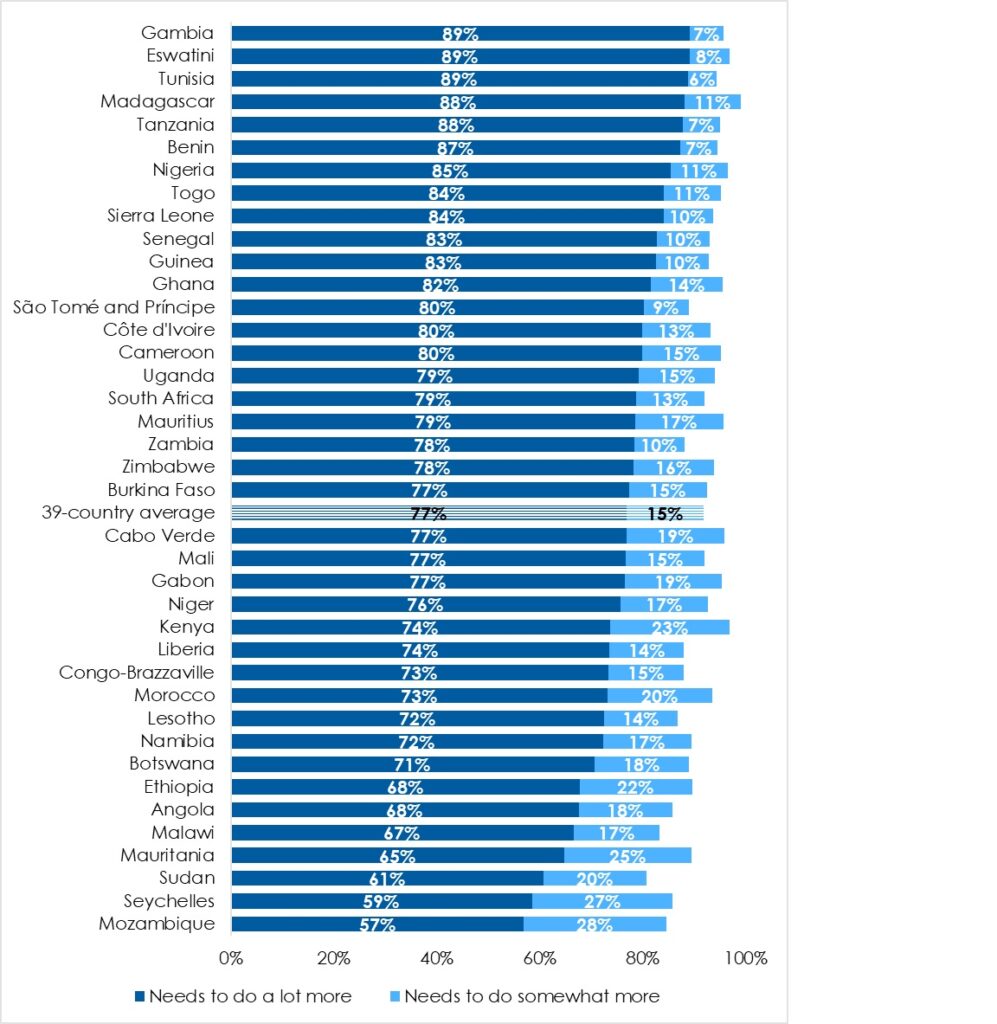
If world leaders, scientists, and activists gathering in Dubai for the 28th U.N. Climate Change Conference (COP28) need a continental push to reach agreement on policies to address climate change, here is one from Africa.
More than 54,000 face-to-face interviews in 39 African countries by the research network Afrobarometer reveal two clear messages:
- An overwhelming majority of Africans familiar with climate change call for immediate measures by their governments, developed countries, and the private sector to mitigate the threat, even at considerable cost.
- Half of Africans are still unaware of climate change, leaving them unable to take protective steps and become part of the solution.
Taking action to combat the causes and consequences of climate change is particularly urgent for Africa. Although the continent is responsible for less than 3% of global greenhouse gas emissions, Africa is one of the world’s most vulnerable regions to climate change. And Africans are projected to experience some of the most severe impacts as global temperatures increase.
The most recent assessment report by the U.N. Intergovernmental Panel on Climate Change (IPCC) details temperature increases due to human-caused climate change across Africa. Many areas across the continent have warmed more rapidly than the global average. Rising sea levels leave cities in East, West, and North Africa particularly at risk, and changes in rainfall patterns have worsened droughts and floods across the continent.
During the recent Africa Climate Summit in Nairobi, Kenya, African leaders reemphasized the need to accelerate and scale up measures to improve climate-change resilience and adaptation capacities. Yet improving domestic capabilities to respond to the escalating severity of climate impacts requires the informed buy-in of citizens as well as political leaders.
Afrobarometer’s latest survey findings suggest that buy-in is the easy part, but only once citizens are informed.
Experience and awareness of climate change
Many Africans report experiencing changes in climate. On average across 39 countries surveyed between late 2021 and mid-2023, almost half (47%) of respondents say droughts have become “somewhat more severe” or “much more severe” in their region over the past 10 years. More than one-third (35%) say the same about floods. Reports of worsening droughts are particularly frequent among less educated (52%) and poor (54%) citizens, rural residents (52%), and those working in the agricultural sector (53%).
Yet these groups are especially unIikely to be aware of “climate change.” Overall, only about half (51%) of Africans say they have heard of the concept. That response ranged from just 22% in Tunisia, which sits on the Mediterranean Sea, to 80% in the Seychelles, an archipelago of 115 islands in the Indian Ocean. Climate-change awareness has stagnated or even decreased in most countries since Afrobarometer first asked the question in its 2016-2018 round of surveys.
Only 38% of respondents without formal schooling have heard of climate change (vs. 73% of those with post-secondary education). And Africa’s poorer citizens, rural residents, women, and agricultural workers all lag behind in awareness of the threat (Figure 1).
Figure 1: Awareness of climate change | by demographic group | 39 countries | 2021/2023

Among Africans who are aware of climate change, almost three-fourths (72%) say it is making their lives worse (Figure 2). In Madagascar, a remarkable 91% share this view. Only five countries record fewer than half of respondents who see climate change as harming their quality of life: Namibia (49%), Mozambique (47%), Ethiopia (45%), Sudan (41%), and Mauritania (38%).
Figure 2: Negative effects of climate change | 39 countries | 2021/2023
![Graph showing Afrobarometer survey results, Surveys asked respondents who are aware of climate change: Do you think climate change is making life in [country] better or worse, or haven’t you heard enough to say? (% who say “somewhat worse” or “much worse”). Respondents who are not aware of climate change are excluded from this question.](https://goodauthority.org/wp-content/uploads/2023/11/Fig2-Negative-effects-bh-27nov23-997x1024.jpg)
Fighting climate change
As African governments negotiate the next steps at COP28, it is important that they understand to what extent their citizens are willing to make sacrifices to deal with the drivers of climate change, as well as the negative consequences.
Among Africans who are climate-change aware, more than three-fourths (77%) think ordinary citizens have a role to play in limiting climate change. And a similarly large majority (74%) say their government must act now to limit the effects of climate change, “even if it is expensive or causes some job losses or other harm to our economy.”
This is the majority view in all 39 surveyed countries, a view shared by nearly 9 out of 10 citizens in Madagascar (89%), Mali (89%), Ghana (87%), and Guinea (87%) (Figure 3). Support for urgent government action drops below two-thirds in just seven countries – Morocco (63%), Cabo Verde (63%), Seychelles (63%), South Africa (63%), Mauritania (62%), Angola (61%), and Gabon (54%).
Figure 3: Government must act now to limit climate change | 39 countries | 2021/2023

Their call to action is emphatic. More than three-fourths (77%) say their government needs to do “a lot more” to curtail climate change. And 15% say government needs to do “somewhat more” – making the expectation of greater government initiative nearly universal (92%), as shown in Figure 4.
About 7 in 10 Africans are looking for “a lot more” action from developed countries (71%) and the business community (69%). Only 6% to 7% say these stakeholders are “doing enough” to fight climate change.
Figure 4: Are stakeholders doing enough to limit climate change? | 39 countries | 2021/2023

The call for “a lot more” government action has majority support in all of the surveyed countries – in 25 of the 39 countries, that was the answer more than three-fourths of respondents gave (Figure 5). Almost 9 out of 10 respondents agree in the Gambia (89%), Eswatini (89%), Tunisia (89%), Madagascar (88%), and Tanzania (88%). Even in countries with the weakest demand for “a lot more” government initiative – including Mozambique (57%) and Seychelles (59%) – support for at least “somewhat more” climate action exceeds 80%.
Figure 5: Government needs to do more to fight climate change | 39 countries| 2021/2023

Climate change is a problem too vast and too complex for simple answers or one-off solutions. It requires building common understandings around causes and the importance of effective adaptation strategies. And effective strategies are especially important – and urgent – for Africa.
As African leaders engage with representatives from other countries at COP28, they can be certain that their citizens back home have high expectations of them. And these surveys suggest citizens are also prepared to do their part – evidence of buy-in that is likely to grow as more Africans learn about climate change.
Alfred Kwadzo Torsu is a research analyst for Afrobarometer.
Matthias Krönke is a researcher in the Afrobarometer Analysis Unit.



